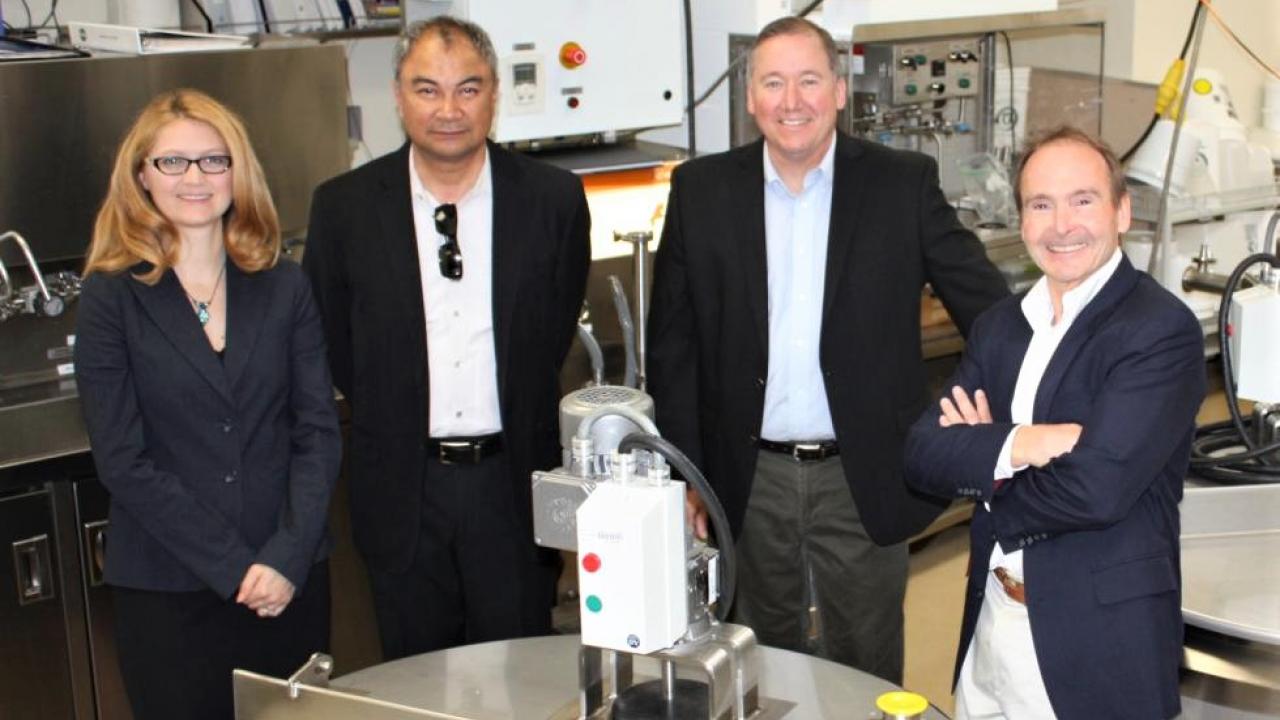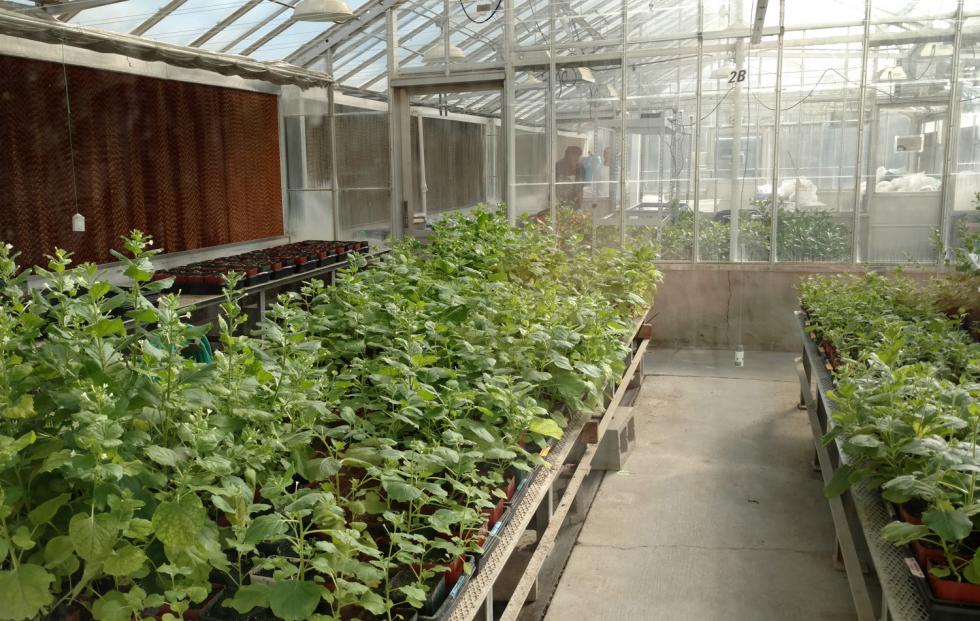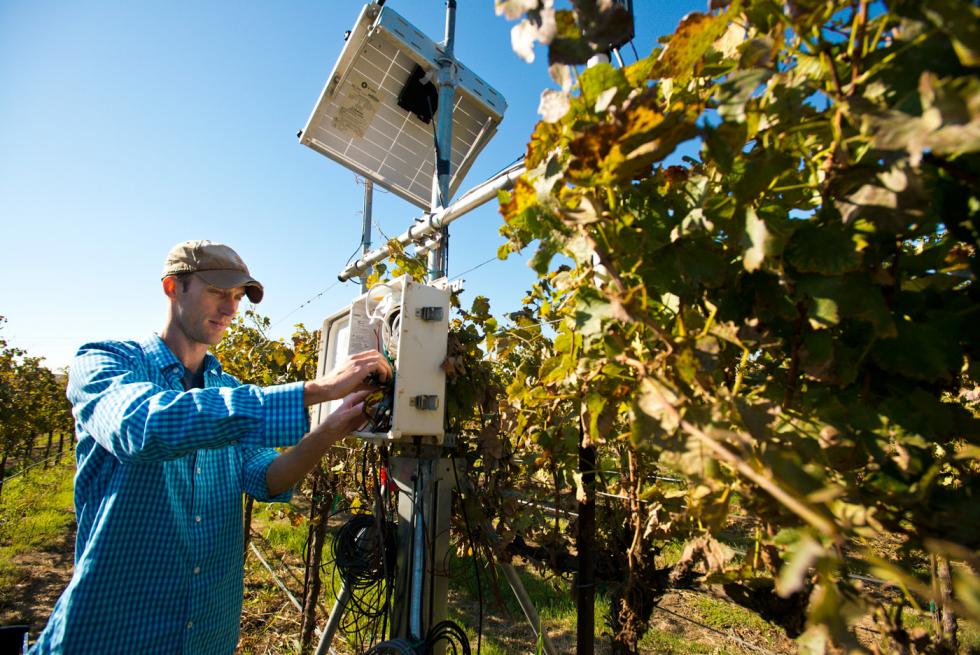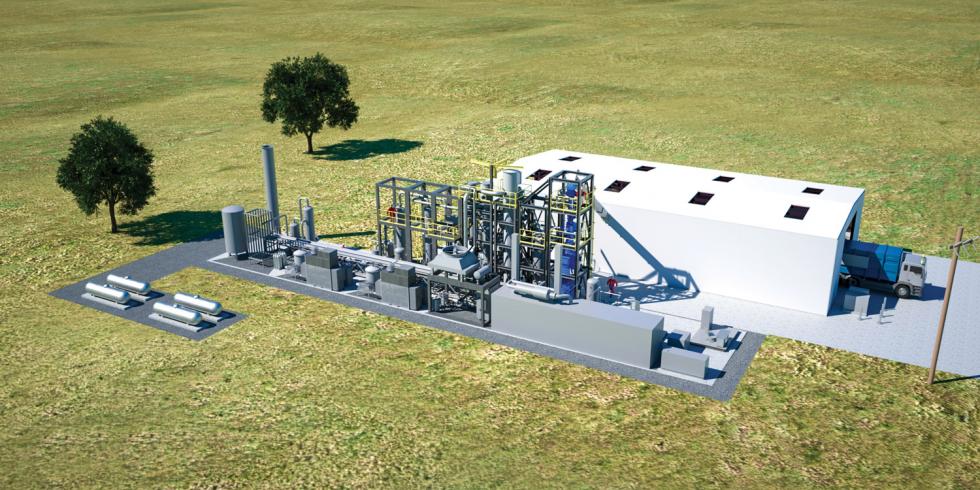
From Lab to Launch
Evolve Biosystems founding scientists: Daniela Barile, Carlito Lebrilla, David Mills and Bruce German.
In their research, a culprit emerged — the absence of an essential gut bacterium called B. infantis that allows infants to break down complex sugars, bringing a host of protective benefits. The bacterium’s presence in breast milk has declined in tandem with the rise of new practices — the use of infant formula over breast milk, exposure to antibiotics and higher rates of C-sections — all of which decrease its introduction and proliferation in the infant gut.
The group came up with an idea: Develop products containing B. infantis that can be mixed with breast milk to re-colonize infants’ intestinal tracts. They formed Davis-based Evolve BioSystems and approached the university’s Venture Catalyst unit of the Office of Research, which helps university-based startups through the licensing and launch process. That landed them an introduction to a venture capital firm and eventually $9 million in first-round funding in August 2015.
Related: Startup of the Month: LiquidGoldConcept
Their products are now in clinical trial, and CEO David Kyle says that so far all of the infants treated have returned to healthy intestinal levels of B. infantis. If the test results hold and the bacterium turns out to be as important as they think, Kyle says their products “could have the biggest impact on worldwide public health since the development of vaccination.”
Venture Catalyst is one part of a multipronged effort at the school that its leaders say is helping turn university research into companies that produce world-changing technologies. The school has facilitated a total of 49 startups in the last four fiscal years, up from 18 in the four years prior.
From Researcher to Entrepreneur
Many universities around the country are encouraging the introduction of university-developed technology and research into the marketplace. In 2015, more than 1,000 such spinoffs were created nationwide, according to the Association of University Technology Managers. It’s one important part of the argument that public investment in state universities justifies the cost. Since 1995, for example, U.S. universities have launched about 11,000 spinoffs that created about 3.8 million jobs, according to the group.
It wasn’t always that way. Before 1980, if federally-funded academic research resulted in an invention, government rules prohibited the university from granting an exclusive license to the discovery. In practice, that meant few companies were willing to buy a license to a federally-funded invention and invest the startup costs involved in testing its efficacy — another company could simply acquire the license on the same terms if the invention proved successful.
That changed with the Bayh-Dole Act of 1980, which gave academic institutions the right to claim title to inventions made with federal funding. The new law allowed universities the right to sell exclusive licenses on what their researchers invented using federal dollars, while requiring schools to share proceeds with researchers.
Some researchers argue this law has changed academia, shifting the focus away from fundamental research — which often takes years or decades to yield benefits — to applied research. Others say it rewards secrecy on campus, since researchers are afraid they’ll lose control of a potentially lucrative discovery. But two of the law’s defenders, in a 2010 article in the journal Science Translational Medicine, point to studies contending that researchers who commercialize an invention publish more and draw more grant funding to their programs.
Related: Startup of the Month: Atocera Inc.
The rising startup numbers at UC Davis come despite what some see as major blows to the city of Davis as an innovation hub. The university and the region, for example, still lack a major research park, though UC Davis and HM Clause have teamed up since 2015 to offer a modest 3,100 square feet of wet lab space in south Davis. And the June referendum defeat of the Nishi Gateway, which would have included 325,000 square feet of research and development space, means the university still is far from matching the incubator space available at facilities like the Stanford Research Park.

The HM Clause/UC Davis Life Science Innovation Center includes this greenhouse in a 3,100-square-foot wet lab.
The starting point for understanding the spike in UC Davis entrepreneurship might be the university’s Institute for Innovation and Entrepreneurship, started in 2011 with an alumni endowment. It built on an earlier incarnation begun in 2006, when researchers in the university’s sciences departments asked to take classes at the business school, says Executive Director Cleveland Justis.
Among other programs, the Institute runs several-day Entrepreneurship Academies — boot camps that connect students and faculty with business professionals, and introduce them to everything from elevator pitches and the legalities of intellectual property to the process for honing a business idea and identifying customers. A larger goal, Justis says, is to help those interested in commercializing a discovery to begin thinking like entrepreneurs.
One beneficiary is Ian Kennedy, a professor in the school’s mechanical and aerospace engineering department. He and his postdoctoral research assistant Sudheendra Lakshmana had come up with a nanotechnology that could detect environmental biotoxins like pesticides. The idea in hand, they incorporated a company, SonanuTech, in 2011. But turning their research into a saleable product was another story. “It’s one thing to do research in the lab and write a paper and get it published,” Kennedy says. “It’s another to produce something that actually works cheaply and reliably, and that the industry wants.”
So Kennedy attended an Entrepreneurship Academy two years ago that gave him the basics of planning a business startup. Eventually he and his team adapted their tool to detect pathogens in food products and targeted a problem in the cheese industry — pathogens that wipe out the bacterial cultures on which cheese companies rely to make their product. The company’s nano-tester cuts the time needed to detect disease-causing bacteria from one or two days to 10 minutes, which could save millions in shut-down time and lost milk, Kennedy says.
Now the company, based in Davis and employing five staff with Lakshmana as CEO, has a prototype detector that’s worked well in the lab. According to Kennedy, two major cheese companies are already interested. SonanuTech is working on raising capital to get it into the hands of potential customers.
From Entrepreneur to Launch

Tom Shapland, cofounder of Tule Technologies, checks one of his devices being used for a precision irrigation project at a UC Davis vineyard
For university scientists and students who have a more fully mature idea, the school’s Venture Catalyst unit, operating since 2013, guides them through the startup phase. Dushyant Pathak founded and heads up the unit. Before coming to UC Davis five years ago, he had spent many of his previous 15 years launching and running startups in the drug discovery and drug development space. Venture Catalyst helps university-based startups set up their corporate structure, makes introductions to mentors and investors, and connects them to incubation space. “It tries to give our startups the best likelihood of being successful and thereby making an impact on society,” says Pathak.
For entrepreneur Tom Shapland, Venture Catalyst’s help was critical in licensing a technology that he and his team had developed in a UC Davis lab. As a post-doc in 2013, Shapland and his research group came up with a sensor that sits above a farm field and measures plants’ evapotranspiration, which indicates both how much water stress they’re under and how much the farmer needs to irrigate.
But first they had to license the technology, which belonged to the university system because it was developed in a school lab. Pathak and the Venture Catalyst team were critical in navigating the complex university licensing process, Shapland says. Today his company, Tule Technologies, has a thousand sensors throughout California used by 300 farm companies covering 19 crops, he says.
From Launch to Startup Capital
Even after launch, on-campus entrepreneurs struggle to attract investors. The school’s World Food Center helps food and ag startups spawned from the university make those connections. Launched in 2013, the Center’s broader mission is to leverage the university’s technical excellence in agriculture for a real-world impact. To help connect startups to funding, the Center participates in national ag-tech investment conferences, according to Associate Director Josette Lewis.
XTB Laboratories is one of those startups. Cristina Davis, a professor of mechanical and aerospace engineering, launched the company earlier this year with a new diagnostic test for diseases in commodity crops, like citrus greening — which kills trees and ruins fruit production, and has affected millions of trees since being discovered in the U.S. in 2004. The test works before symptoms even emerge. In September, the Center sponsored Davis to present on her company as part of a competition at the Ag Innovation Showcase, the premier national conference connecting agricultural startups and investors. Davis introduced her technology to and got feedback from leaders in a variety of agricultural industries — and came away with the conference’s grand prize of $10,000.
UC Davis also runs its own competitions that attract attention from investors. The Institute for Innovation and Entrepreneurship’s yearly Big Bang! Business Competition — in which participants develop and pitch their business ideas — brought in 42 teams this year.
A 2008 Big Bang victory kick-started VinPerfect, a now 5-year-old company that tackled a vexing problem in the wine industry: how to replace often-unreliable enclosures like cork that founder Tim Keller says can ruin otherwise good wines. Keller created a cap with a liner that allows only precise amounts of oxygen through, depending on the wine type. After his Big Bang victory, he got funding from the Sacramento Angels investment group that allowed him to conduct three years of painstaking research and development. VinPerfect went live in 2011 and all told has raised $2.7 million in venture capital, growing to eight employees. “Winning Big Bang was a huge step in credibility,” Keller says.
From Capital to Economic Growth
None of this means startups birthed at the university will stay in the school’s orbit. Of the 14 UC Davis startups launched in fiscal year 2015-2016, six are headquartered elsewhere — in the Bay Area, New York, Indiana and Canada (though the firm north of the border is exploring returning to the area, Pathak says).
Justis says it’s natural for startups to move to where resources like incubation space and venture capital are located. He also stresses the importance of recognizing that big companies are coming to the Capital Region to stay on top of cutting-edge developments in their industries. He points to private-equity firm AGR Partners, which specializes in agribusiness and food companies and just moved its headquarters to Davis. He also flags candy giant Mars Inc.’s $40 million investment in the Innovation Institute for Food and Health, which is part of the World Food Center. Mars coming to Davis is “not unlike Xerox going to the Silicon Valley in the ‘60s. They’re putting some top people in Davis-Sacramento, where they can stay on top of emerging trends in regulation, science and technology,” Justis says.
Related: How UC Davis is Bolstering Region’s Agtech
There may be no substitute for a major research park, which Barry Broome of the Greater Sacramento Economic Council says is an impediment to attracting companies and keeping UC Davis spin-offs in the region. But the area’s startup culture is starting to loop back on itself by investing in facilities where other startups can test their ideas. Exhibit A is a waste gasification company called Sierra Energy, borne out of a 2002 Big Bang competition. CEO Mike Hart is working with Keller to spearhead development of the new Area 52 business incubator in Davis, which will be home to entrepreneurs in medical, aerospace, agricultural and other technologies. Hart also is designing the Zero Waste Innovation Park — a local facility where startups working to turn waste into something of value can test their products, under the scrutiny of third-party evaluators. UC Davis is the lead academic partner, and Hart says they’re hoping to build the facility somewhere between Sacramento and Davis.
Pathak also believes in building bridges between the school’s startup efforts and drivers of local economic development, which is an important part of his office’s role, he says. One of his first hires at Venture Catalyst was an associate director for economic engagement to work with local startup incubators and support networks like AgStart, MedStart, I/O Labs, and the state government’s GO-Biz iHub program.
“At the end of the day, if we expect to be, as we believe we will be, the university of the 21st century,” says Pathak, “we have to make sure that the university and the region are growing in lockstep.”
For more info, please click the following link:
https://www.comstocksmag.com/longreads/lab-launch

